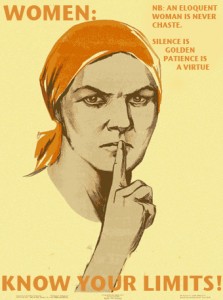Listening to Terry Tempest Williams being interviewed last night on NPR’s “To The Best of Our Knowledge,” I was captivated by her discussion of women’s self-silencing. Williams is the author of “When Women Were Birds,” a book built around the fact that when, based on her mother’s death-bed invitation, she went to the family home a month post-funeral to read her mother’s journals (three shelves of cloth-bound books), she discovered that every page was blank.
In Williams’ words:
“You know, when I saw those…journals, I thought, finally I can read what my mother was thinking. And then the first blank, the second blank, the third, the fourth, the fifth, the sixth, all of my mother’s journals blank. It was like a second death and I just stuffed that down into the toes of my boots and just didn’t deal with it. And really…it wasn’t until I was 54, the age my mother was when she died that I brought that story back into consciousness, thinking, OK, why. What was my mother really trying to say to me?”
And later in the interview:
“[My mother] spoke to me but I know there’s so much she never said. I saw the price that my mother paid for remaining silent. I saw the price that my mother paid for her grace and I think as her daughter I was very conscious of my anger. Call it sacred rage. You know, I think in some areas I have found my voice through my anger. I also have to say in the beginning I thought I was writing a book about voice but I think in the end I may have written a book about silence. What do we speak of? What do we withhold? And I think that’s a constant assessment for women because the consequences when we speak out.”
These words hit me hard. I’m a writer. I write at every opportunity. I have kept journals since I was a teen, and this blog for several years. I also post regularly on Facebook, write reviews for Yelp and Amazon, and have even been published (in Woman’s Day, Sierra Life, and various local newspapers). I’m such a compulsive writer that I keep a notepad by my bed (for dreams) and yellow Post-It notes on my living room end table, so that I can scrawl down random thoughts at need. If you opened my seldom-used checkbook, you would find its pages ornamented with scribbles written furiously at stoplights — the checkbook being the only available paper when inspiration hits while driving.
And, in every writing, the urge to censor myself has been keenly felt, whether because of the critical audience in my head, fear of offending, or just plain fear of being seen too clearly, too well. Our culture has long heralded the “strong, silent type.” We all know that familiarity breeds contempt. My own beautiful mother keeps so much of herself TO herself that on the rare occasion when she discloses something personal to me it’s as if she has offered me a rare and fragile gift. I’m almost afraid to take it in for fear of breaking it in my clumsy appreciation. And I have always wanted to be like my mother, but this writing compulsion betrayed me from an early age.
I have long disdained being ruled by fear. Legislation by fear, management by fear, fear-driven decision-making, fear-driven behaviors — nothing good ever comes from letting fear govern our lives. And yet, every time I write something about myself, I feel that twinge of self-doubt: Should I not say that? Will this come back to bite me? Does that seem strange? Is this offensive? Although of course our public voice must be tempered with equal measures of compassion and good judgment, that kind of second-guessing robs writing and life of its rich spontaneity.
Towards the end of her interview, Williams said this:
“I still choose to speak because I think that that which is most personal is most general. And I do have a voice in the world. And if I’m afraid then I know that other people are afraid too.”
Hearing that, I felt something catch in my chest. For a moment I imagined the exhilaration of speaking one’s mind with courage, of writing one’s words without fear followed by deletion. I think, to an extent, we are all afraid to be truly known, to be “found out.” But I also know that — in the words of my dear friend Rachel — when we “unzip and show our souls,” some of the most brilliant and breathtaking connections can be made with others, and I know that true intimacy is born in those moments of knowing one another and being known, fearlessly. It mystifies me that there’s a trade-off. I will never have my mother’s grace and mystery, for my words are everywhere now, my life’s graffiti, sometimes elegant, sometimes not. There exists a written record of this experience I choose to call the quest for self-actualization but in reality is just me, noticing. My mother notices with still and undocumented sureness. I notice in big broad noisy strokes. Like Williams’ mother’s empty journals, these choices are the stories of our lives.

